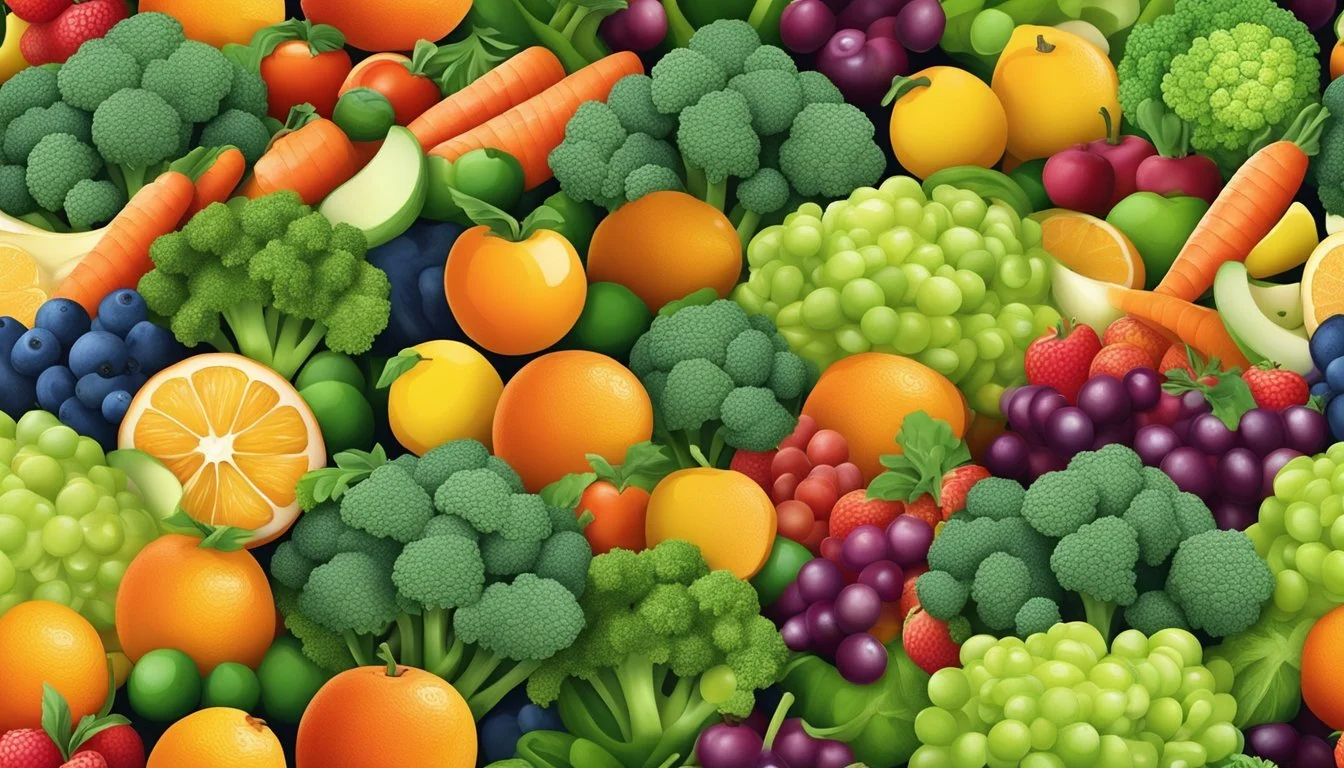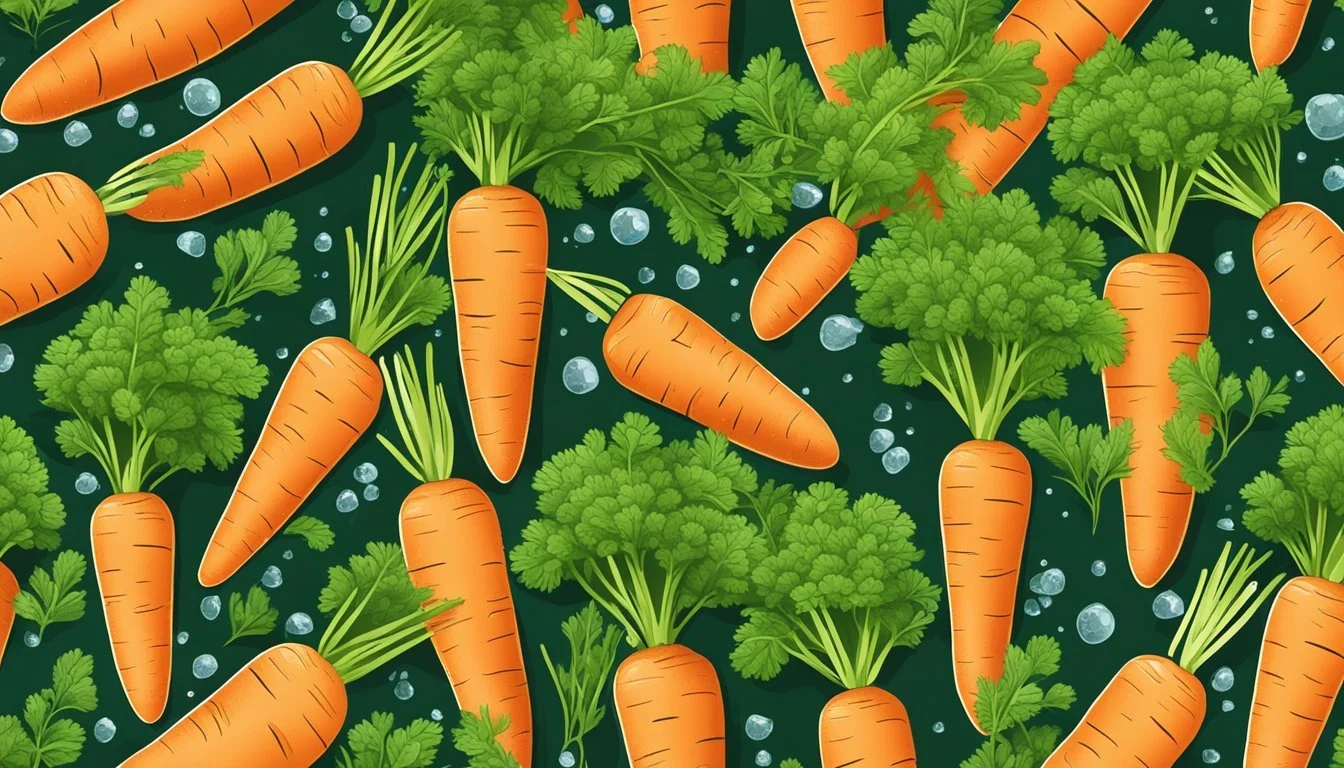Foods High in Soluble Fiber
Essential Choices for Better Digestion
Healthy eating often incorporates a variety of foods that promote overall well-being and prevent chronic diseases. One significant component of such diets is soluble fiber, which plays a vital role in maintaining digestive health and supporting other bodily functions. Understanding which foods are high in soluble fiber can guide individuals in making better dietary choices.
Soluble fiber is found in many common foods and offers numerous health benefits. While many people may know about the importance of fiber, knowing specifically which foods are high in water-soluble fiber can help in tailoring a diet that enhances digestive efficiency, manages blood sugar levels, and lowers cholesterol. From fruits and grains to beans and seeds, the variety of foods high in soluble fiber ensures that there is something for everyone's palate.
1) Oats
Oats are a well-known source of soluble fiber, making them a popular choice for those looking to improve their diet. The primary type of soluble fiber found in oats is called beta-glucan. This particular fiber has been associated with lowering cholesterol levels and reducing the risk of heart disease.
Beta-glucan in oats also plays a significant role in regulating blood sugar levels. It slows down the absorption of carbohydrates, which helps in maintaining steady glucose levels. This can be particularly beneficial for those managing diabetes.
In addition to their fiber content, oats offer various vitamins and minerals, including manganese, phosphorus, and magnesium. These micronutrients contribute to the overall nutritional value of oats, making them a healthy addition to breakfast or snacks.
Oats can be easily incorporated into the diet in various forms. Common options include oatmeal, overnight oats, and oat-based smoothies. Their versatility and health benefits make them a staple in many households.
The Food and Drug Administration even permits health claims on food labels linking beta-glucan from oats to heart health, highlighting their importance in a balanced diet.
2) Barley
Barley is an excellent source of soluble fiber. Specifically, it contains beta-glucans and inulin, two types of soluble fibers that promote gut health by acting as prebiotics.
These fibers help maintain healthy bowel movements and can aid in managing digestive health. Barley provides a substantial amount of fiber, with hulled barley offering 17.3 grams per 100 grams of dry weight.
Including barley in the diet can support overall digestive function. These benefits make barley a valuable addition to meals such as soups, salads, and side dishes.
Apart from its fiber content, barley is also rich in vitamins and minerals, contributing to a balanced diet. Its versatility and health benefits make it a popular choice for those looking to improve their fiber intake.
3) Psyllium Husk
Psyllium husk is derived from the seeds of the Plantago ovata plant, native to India. It is known for its high content of water-soluble fiber, which can dissolve in water and form a gel-like substance.
This gel slows down digestion and can help the body absorb more nutrients. Because of this, psyllium husk is often used as a dietary supplement to promote digestive health.
Adding psyllium husk to the diet has been linked to various benefits, including improved bowel regularity and increased stool bulk. It absorbs water efficiently, making it easier for the intestines to pass waste.
In addition to its digestive benefits, psyllium husk may contribute to cardiovascular health. Diets high in soluble fiber, like psyllium husk, have been associated with lower triglyceride levels and reduced risk of heart disease.
Psyllium husk can be consumed in various forms, including powder, capsules, and as an ingredient in baking. It is important to drink plenty of water when consuming psyllium to prevent any potential digestive discomfort.
Always consult with a healthcare provider before starting any new supplement, especially for those with existing health conditions.
4) Brown Rice
Brown rice is an excellent source of insoluble fiber, which supports digestive health. Insoluble fiber aids in preventing constipation by adding bulk to the stool and promoting regular bowel movements.
Unlike white rice, brown rice retains the bran layer. This layer is rich in essential nutrients, including fiber, minerals, and antioxidants like flavonoids. This composition makes brown rice a more nutritious option compared to its refined counterpart.
In addition to its insoluble fiber content, brown rice also contains some soluble fiber. Soluble fiber is beneficial for maintaining healthy cholesterol levels and supporting heart health. The combination of both fiber types makes brown rice a valuable inclusion in a balanced diet.
5) Apples
Apples are a prominent source of water-soluble fiber, specifically pectin. Pectin dissolves in water, forming a gel-like substance that aids digestion. This fiber can help manage cholesterol levels by reducing the absorption of cholesterol into the bloodstream.
Eating apples regularly can support digestive health. The pectin in apples also assists in maintaining steady blood sugar levels, making them beneficial for individuals managing diabetes. Additionally, apples can contribute to improved bowel movements.
Apples are versatile and can be enjoyed in various forms – fresh, baked, or as part of dishes and salads. They are widely available and can be included in the diet throughout the year. With their blend of soluble fiber and other nutrients, apples are an excellent choice for sustaining good health.
6) Citrus Fruits
Citrus fruits are excellent sources of water-soluble fiber. They contain pectin, a type of soluble fiber that helps reduce cholesterol levels and regulate blood sugar.
Oranges are among the most popular citrus fruits. A medium-sized orange provides about 1.8 grams of soluble fiber. This makes them a tasty and healthy option for increasing dietary fiber intake.
Grapefruits are another beneficial choice. Half of a medium grapefruit contains roughly 1 gram of soluble fiber. Grapefruits also provide high levels of vitamins and antioxidants.
Lemons and limes are commonly used for their juice and zest. Both of these contain soluble fiber, although in smaller amounts compared to oranges and grapefruits.
Including a variety of citrus fruits in the diet is an effective way to boost soluble fiber intake. They are versatile and can be added to salads, drinks, and desserts.
7) Carrots
Carrots are a nutritious vegetable known for their vibrant orange color and crunchy texture. They are an excellent source of water-soluble fiber, which plays a significant role in digestive health.
Water-soluble fiber in carrots helps to slow down digestion, promoting a feeling of fullness. This can be beneficial for weight management.
Carrots also aid in stabilizing blood sugar levels. The soluble fiber forms a gel-like substance in the gut, which can help to lower glucose absorption.
In addition to fiber, carrots provide other essential nutrients, such as beta-carotene, vitamin K1, and antioxidants. They can be consumed raw, cooked, or as part of various dishes.
Adding carrots to the diet is an easy and delicious way to boost fiber intake. They can be included in salads, soups, and stir-fries or enjoyed as a healthy snack.
8) Potatoes
Potatoes are a staple in many diets worldwide and provide a source of both soluble and insoluble fiber. The soluble fiber in potatoes helps regulate blood sugar levels by slowing down the absorption of sugars in the digestive tract.
A medium-sized potato, when baked with the skin, contains around 2 grams of fiber, a part of which is soluble. Consuming potatoes with their skin ensures you receive the maximum fiber benefits.
Soluble fiber in potatoes can aid in lowering cholesterol levels by binding with cholesterol particles and taking them out of the body. This process can be beneficial for heart health.
Additionally, potatoes are versatile and can be included in various dishes. Boiled, mashed, or baked, they can easily be incorporated into meals, making it convenient to boost your fiber intake.
9) Beetroot
Beetroot is an excellent source of soluble fiber. This root vegetable contains around 0.7 grams of soluble fiber per half-cup serving. Soluble fiber helps manage digestive health by forming a gel-like substance in the intestines, which can aid in promoting regular bowel movements.
Beetroots are packed with essential nutrients like folate, manganese, potassium, and vitamins B9 and C. Their high water content and fiber support a well-balanced diet. These nutrients contribute to various health benefits, including improved blood flow and reduced blood pressure.
Incorporating beets into meals can be easy and versatile. They can be eaten raw, roasted, or juiced, making them a convenient addition to salads, smoothies, and side dishes. Regular consumption of beetroot may offer enhanced digestive support and overall wellness due to its rich soluble fiber content.
10) Flaxseeds
Flaxseeds are not only nutritious but also an excellent source of both soluble and insoluble fiber. Approximately 25% of the fiber in flaxseeds is soluble.
This soluble fiber can help enhance gut health by improving the gut microbiome. It also plays a role in managing cholesterol levels.
The fiber in flaxseeds absorbs water, forming a gel-like substance in the digestive tract. This aids in promoting regular bowel movements and preventing constipation.
Adding ground flaxseeds to the diet enhances the nutritional profile of various dishes, including smoothies, cereals, and baked goods. Their versatility makes them easy to incorporate into daily meals.
In addition to fiber, flaxseeds are rich in omega-3 fatty acids, protein, and lignans, which contribute to their health benefits.
Health Benefits of Water-Soluble Fiber
Water-soluble fiber significantly contributes to digestive and heart health. This type of fiber dissolves in water, transforming into a gel-like substance that aids in various bodily functions.
Digestive Health
Water-soluble fiber plays a crucial role in maintaining digestive health. It assists in regulating bowel movements by softening stool and increasing its bulk, making it easier to pass. This helps to prevent constipation and promotes a healthy digestion process.
Foods high in water-soluble fiber, such as oats, beans, and fruits, slow down the digestive process. This prolongs nutrient absorption, providing a more sustained release of energy. Additionally, it acts as a prebiotic, feeding beneficial gut bacteria and supporting a balanced microbiome.
Heart Health
Water-soluble fiber helps manage heart health by lowering blood cholesterol levels. It binds with cholesterol particles in the digestive system and removes them from the body before absorption. This can lead to a reduction in LDL (bad) cholesterol levels.
Moreover, this type of fiber assists in controlling blood pressure and reducing inflammation. Consuming foods rich in water-soluble fiber, like flaxseeds and oat bran, can help reduce the risk of cardiovascular diseases. These foods also help regulate blood sugar levels, contributing to overall heart health.
How Water-Soluble Fiber Works
Water-soluble fiber plays a crucial role in digestion and overall health. It dissolves in water, forming a gel-like substance that supports various bodily functions, including gut health and nutrient absorption.
Solubility and Viscosity
Water-soluble fiber dissolves in water during digestion, creating a viscous, gel-like material. This gel-like consistency slows the passage of food through the digestive tract. This process can help regulate blood sugar levels by slowing the absorption of glucose.
Slower digestion also helps maintain a feeling of fullness, which can aid in weight management. Common sources of water-soluble fiber that exhibit these properties include oats, legumes, apples, and citrus fruits.
Fermentation in the Gut
Once water-soluble fiber reaches the large intestine, it is fermented by gut bacteria. This fermentation process produces short-chain fatty acids (SCFAs), which have several health benefits. SCFAs provide energy to colon cells and help reduce inflammation.
Fermentation also promotes the growth of beneficial gut bacteria, supporting overall digestive health. Foods rich in water-soluble fiber, such as beans, barley, and psyllium, contribute significantly to these beneficial gut processes.





